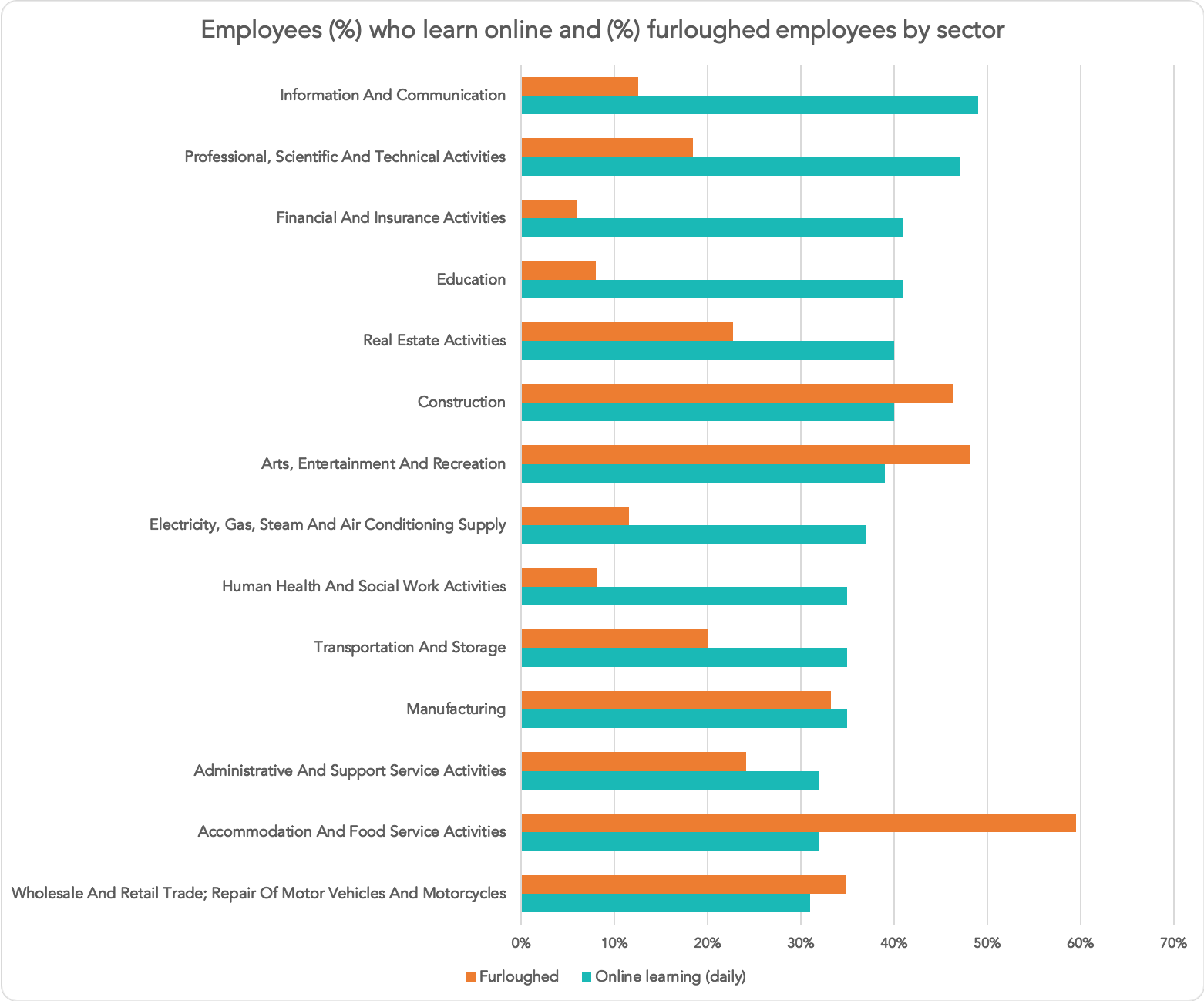Sector-picking: The role of online learning in transforming the labour market
The Government has set up a free online learning platform for furloughed workers to learn new skills. But unless it is redesigned and targeted to the needs of people who are actually on furlough, it will have limited impact while millions face unemployment.
Covid-19 is having some of the most profound impacts on the labour market we’ve ever seen. Not only are many facing unemployment, but as new data indicates, those who are, tend to be working in similar types of jobs: as baristas, bar tenders, cleaners, labourers, and sales assistants.
The lockdown has created one of the sharpest digital divides in the labour market we’ve seen: remote workers and non remote workers. With those who can work remotely able to weather the storm from home, while those who can’t are either on furlough – unsure when and if they’ll be able to return – or looking for other sources of income.
In these strange and challenging times, the Government has difficult choices: do nothing and let businesses and people go under, or support workers and businesses in these sectors indefinitely and hope they can turn a profit again soon. A third option is to try to transform the labour market, building pathways for people to move into different types of work altogether.
To its credit the Government has responded quickly, setting up an online learning platform, the Skills Toolkit. The Toolkit offers a range of digital and numeracy online courses, free to anyone with a good enough computer and a broadband connection. The hope is that millions of workers who are currently on furlough will capitalise on their free time and learn new skills that can support their career progression when they get back to work.
This scheme is well intended. We know that learning new things online can have real and tangible impacts on people, their careers and the economy. In January 2020, Demos found a substantial proportion of people had received a pay rise (29%) or got a job they liked more (36%) as a result of the online learning they had done.
The scheme could offer people opportunities that they’ve not had before: the time and means to learn new skills that enable them to change jobs, progress in their current jobs, or even move into an industry that offers better career opportunities. For the country, this could be an unrivalled moment for the UK to tackle one of the challenges of the century: to get people out of low-wage work and in-work poverty.
But as it stands, there are some key tensions between the purpose of the scheme and the platform which will limit its impact.
The first limitation is that Toolkit itself has been given a very low profile to date and seems to be poorly set up. It has barely been mentioned publicly, and whilst there doesn’t seem to be data on take up, it seems unlikely that it is currently used by more than a fraction of the 8.9 million people on the furlough scheme. The website is sparse, poorly designed and seems to have little actual content: there is no search function, and it is unclear exactly how many and what kind of courses are on offer to prospective students.
The second is the type of people on furlough are least likely to be learning new skills online and benefiting from it. Lower earners, for example, are far more likely to have been furloughed but far less likely to receive a pay rise from online learning. Other, non-digital, methods might be needed initially to reach these potential learners.
The third problem is that the sectors with people most likely to be furloughed are some of the least likely to be learning online or able to progress in their career as a result of it.
As the chart below shows, the sectors with the smallest proportion of employees learning online (daily) are some of the most likely to have people furloughed. In retail and hospitality, that together have 3 million furloughs, only a third of employees are using the internet to learn new skills regularly. It is unlikely that Toolkit offers any courses tailored to progression in these sectors, so if the government is encouraging them to learn new skills to take into another sector this must be more explicit.

Source: HMRC (June 2020) and Demos (January 2020)
These challenges beg some questions: what is the point of the platform in the first place? Who is it for? Is it to help people progress in the sector they are already in or move into new types of work? Is it to encourage more people to learn online? Or is it simply to encourage people to pick up skills for its own sake, as a way of filling time until the economy picks up?
In broad terms, the policy itself is a very good idea, but as it is, it seems half-hearted. It could be highly beneficial if it were more clearly tailored to, and reached out to, the people and the types of work that are not traditionally engaged in online learning. In the process, it could provide the means for people to move out of shrinking sectors like hospitality and retail and into sectors that have more growth potential and pay-progression.
With some re-thinking and better targeting of the Toolkit, this summer – during one of the deepest recessions on record – could be the time when the country really starts to tackle one of the deepest problems of the century: ensuring we all have access to good, well paid work.
